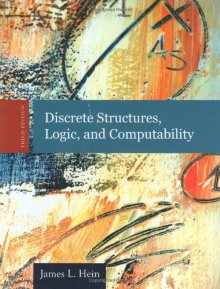
|
FreeComputerBooks.com
Links to Free Computer, Mathematics, Technical Books all over the World
|
|
- Title: Discrete Structures, Logic, and Computability
- Author(s) James L. Hein
- Publisher: Jones & Bartlett Publishers; 3 edition (February 26, 2009)
- Paperback: N/A
- eBook: PDF
- Language: English
- ISBN-10: 0763772062
- ISBN-13: 978-0763772062
- Share This:

|
This book introduces beginning computer science and computer engineering students to the fundamental techniques and ideas used by computer scientists today, focusing on topics from the fields of mathematics, logic, and computer science itself.
Dr. Hein provides elementary introductions to those ideas and techniques that are necessary to understand and practice the art and science of computing. The text contains all the topics for discrete structures in the reports of the IEEE/ACM Joint Task Force on Computing Curricula for computer science programs and for computer engineering programs.
About the Authors- N/A
- Prolog Programming
- Discrete Mathematics
- Mathematical Logic - Set Theory, Model Theory, Computability, etc
- Artificial Intelligence, Machine Learning, and Logic Programming
- LISP Programming Language
- Computer and Programming Languages

- Discrete Structures, Logic, and Computability (James L. Hein)
- The Mirror Site (1) - PDF
- The Student Study Guide - PDF
-
 Elements of Discrete Mathematics (Richard Hammack)
Elements of Discrete Mathematics (Richard Hammack)
This book explains complex, abstract concepts with clarity and precision and provides a strong foundation for computer science and upper-level mathematics courses of the computer age.
-
 A Cool Brisk Walk Through Discrete Mathematics (Stephen Davies)
A Cool Brisk Walk Through Discrete Mathematics (Stephen Davies)
This is a completely and forever free and open source educational materials dedicated to the mathematics that budding computer science practitioners actually need to know. They feature the fun and addictive teaching of award-winning lecturer!
-
 Discrete Mathematics: An Open Introduction (Oscar Levin)
Discrete Mathematics: An Open Introduction (Oscar Levin)
This is a gentle introduction to discrete mathematics. Four main topics are covered: counting, sequences, logic, and graph theory. Along the way proofs are introduced, including proofs by contradiction, proofs by induction, and combinatorial proofs.
-
 Applied Discrete Structures, Fundamentals (Al Doerr, et al)
Applied Discrete Structures, Fundamentals (Al Doerr, et al)
This book contains most of the fundamental concepts taught in a one semester course in discrete mathematics which is a required course for students in Computer Science, Mathematics and Information Technology.
-
 Discrete Structures for Computer Science: Counting, Recursion
Discrete Structures for Computer Science: Counting, Recursion
This book provides a broad introduction to some of the most fascinating and beautiful areas of discrete mathematical structures with examples in logic, applications of the principle of inclusion and exclusion and finally the pigeonhole principal.
-
 Mathematics for Computer Science (Eric Lehman, et al)
Mathematics for Computer Science (Eric Lehman, et al)
This book covers elementary discrete mathematics for computer science and engineering. It emphasizes mathematical definitions and proofs as well as applicable methods. explores the topics of basic combinatorics, number and graph theory, logic and proof techniques.
-
 Mathematical Aspects of Logic Programming Semantics
Mathematical Aspects of Logic Programming Semantics
This book discusses applications of Logic Programming to computational logic and potential applications to the integration of models of computation, knowledge representation and reasoning, and the Semantic Web.
-
 Language, Proof and Logic (Jon Barwise, et al)
Language, Proof and Logic (Jon Barwise, et al)
This book covers first-order language in a method appropriate for first and second courses in logic, and is specially useful to undergraduates of philosophy, computer science, mathematics, and linguistics.
-
 Logic, Programming and Prolog, 2nd Edition (Ulf Nilsson, et al)
Logic, Programming and Prolog, 2nd Edition (Ulf Nilsson, et al)
This book introduces major new developments in a continually evolving field and includes such topics as concurrency and equational and constraint logic programming. What sets this book apart from others on logic programming is the breadth of its coverage.





